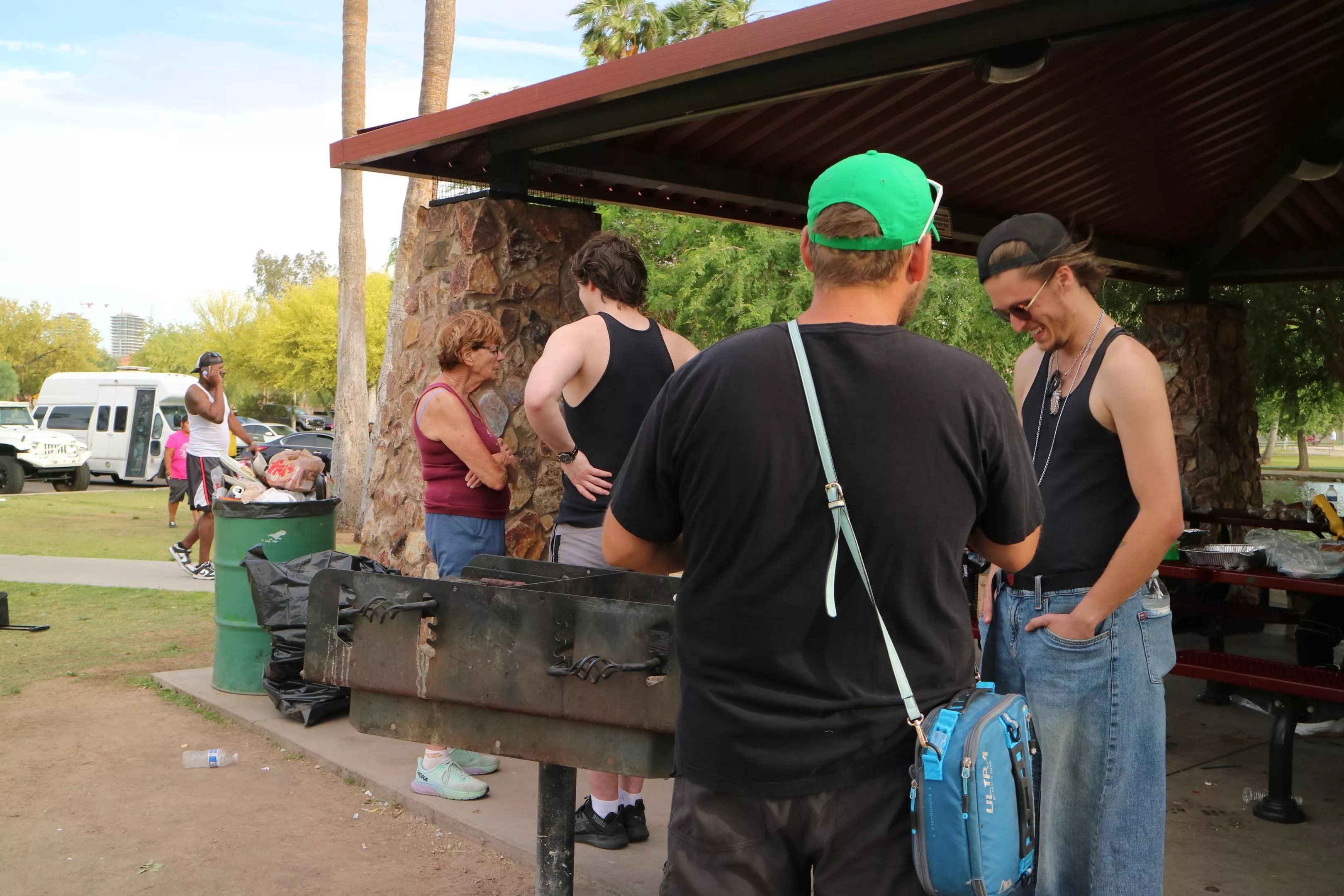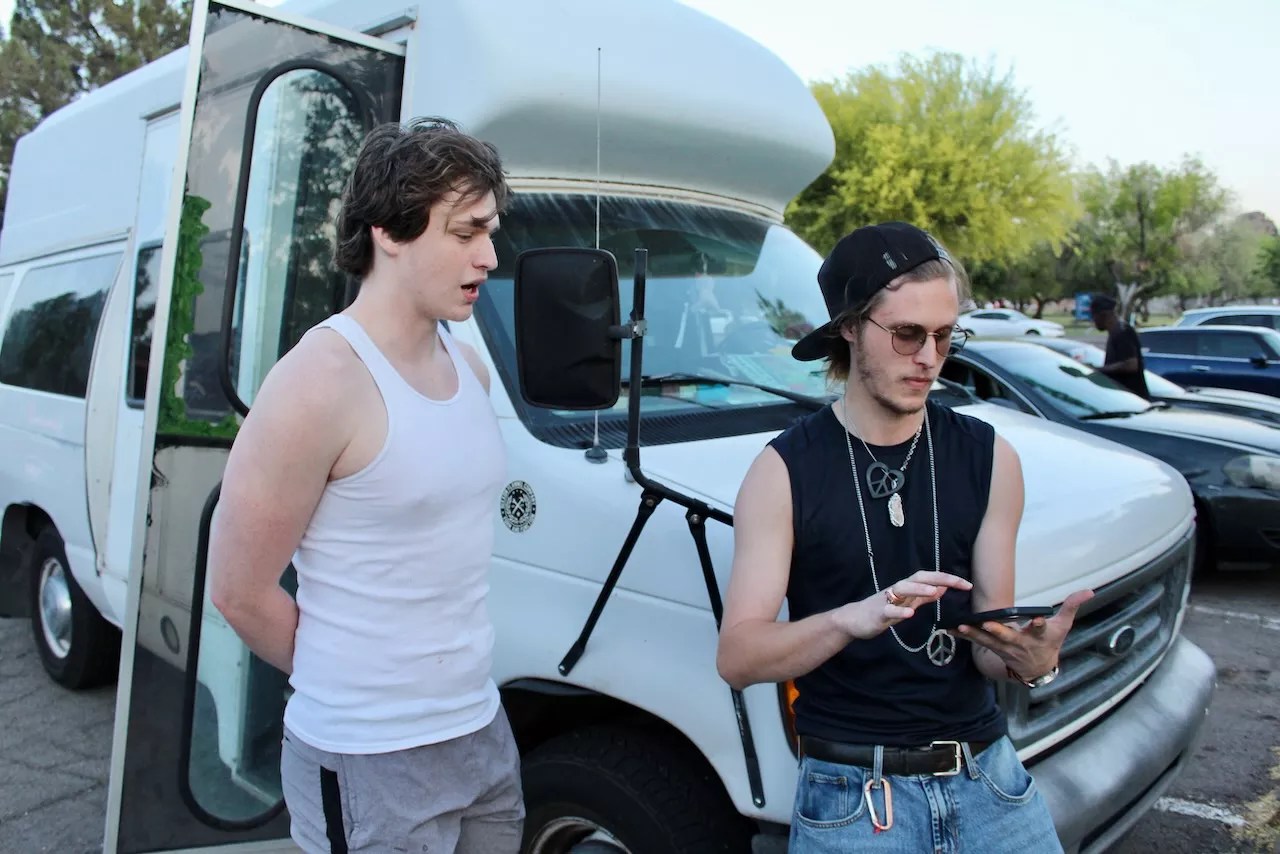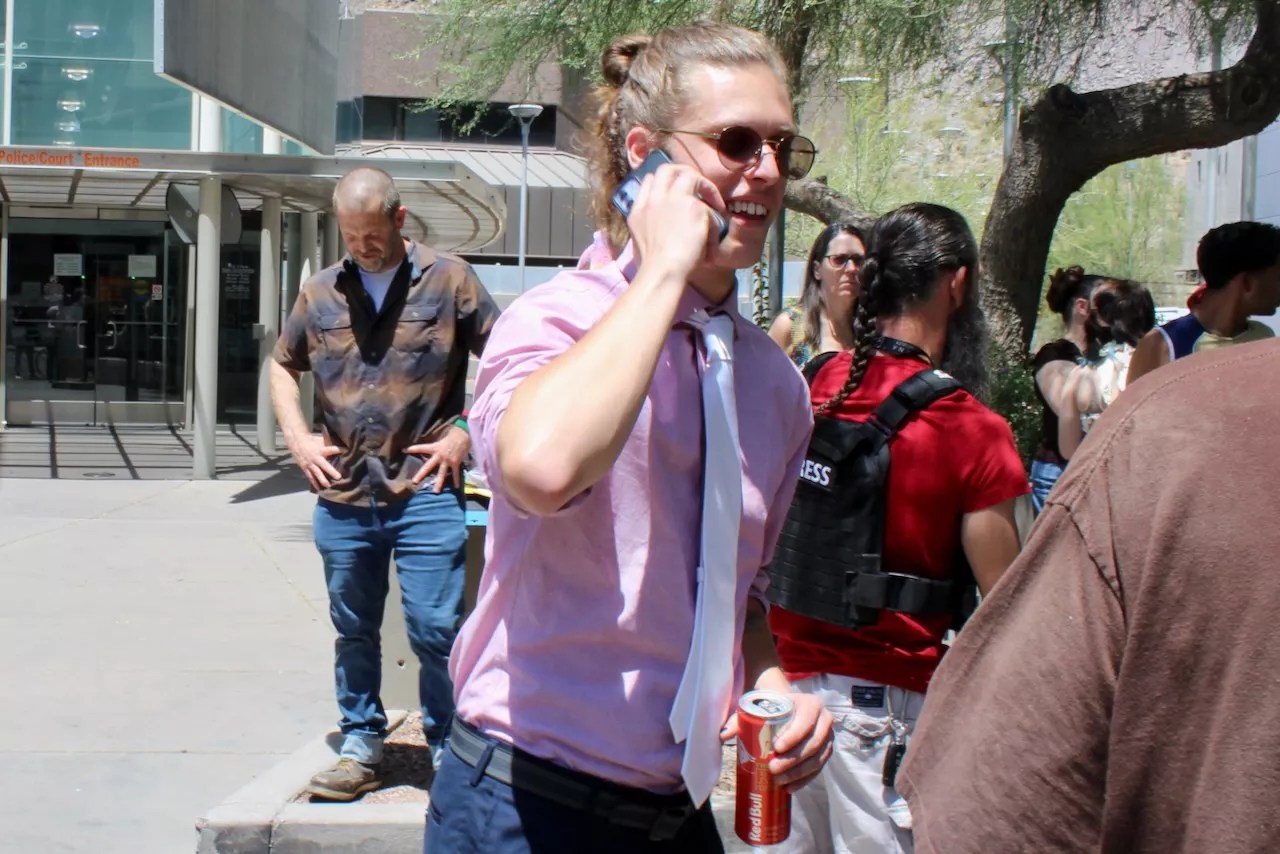
TJ L’Heureux

Audio By Carbonatix
With what little money Austin Davis makes, he gives back.
The 24-year-old majored in poetry at Arizona State and sometimes submits work to literary magazines. Writing poems may be the “least lucrative career,” he joked, so occasionally he delivers for Postmates to supplement his income. Around Tempe, though, he’s known less for what he brings in than what he gives.
For years, Davis has spent his days feeding unhoused people at shelters and parks, where he helps those struggling to find crucial resources such as housing or drug recovery care.
Through AZ Hugs, the nonprofit organization that grew out of efforts Davis began in 2020, he has distributed hauls of free food to the unhoused, previously at Tempe’s Moeur Park and now at Papago Park. At a time when cities and service providers struggle to meet the needs of the estimated 10,000 homeless people in Maricopa County, Davis said his work fills an important need.
“If you don’t know where to go, this is a safe place where you can get some food,” Davis said. “You don’t have to stress, just on your time let’s talk about actionable steps forward.”
For doing so – specifically for doing so without a permit – Davis has been hauled into court by the city of Tempe.
It’s the latest development in a nearly two-year-long legal saga that has been playing out between the city and Davis. In 2022, Tempe officials informed Davis that AZ Hugs needs a permit to distribute food. When the organization applied for one, the city denied it. Davis continued to feed people anyway, leading city prosecutors to charge Davis with six misdemeanors in January.
All but one of those charges were later dismissed without prejudice, meaning the city can refile them later. But a hearing related to the remaining charge occurred Thursday in Tempe Municipal Court. Davis’ defense team argued that the city ordinance Davis is accused of violating is not relevant and that Tempe’s law regulating events was overly broad.
That’s the legal issue at stake. To Davis, another concern is much more consequential.
What will happen to the people if he stops?

Tempe wants Austin Davis (right) to stop feeding the homeless until he secures a permit. Davis worries people will go hungry if he complies.
TJ L’Heureux
Sunday picnics
To spend a day with Davis is to embrace chaos.
Time passes in a blur. Davis flows from task to task: driving to get food, taking people to shelters, talking to community members and making phone calls to place unhoused people in rehabilitation centers.
Davis began this work in 2020 while he was a student at ASU, handing out care packages in downtown Phoenix through the social justice organization Arizona Jews for Justice. In 2021, the project was formalized into the nonprofit AZ Hugs for the Houseless. Every week, the organization hosts its Sunday Picnics and hands out food and supplies to unhoused people.
As a result, Davis and AZ Hugs have built a reputation for themselves among homeless people in Tempe.
“I get so many calls throughout the week, and a lot of them are people who are new to homelessness, just got evicted and have never been on the street before,” Davis said. “The stigmas are still really harmful to our community.”
One of those stigmas has to do with drug addiction. In addition to feeding and supplying people with essential items, Davis helps them find treatment resources. In a post written for the website Tempe 1st, Davis’ father, Guy, claimed that AZ Hugs helped to place nearly 200 in rehab and detox programs last year.
Initially, the weekly picnics won Davis broad acclaim for his efforts. In 2022, the gatherings were voted the city of Tempe’s “Neighborhood Event of the Year.”
That same year, though, the city demanded that Davis apply for a special event permit.
A frustrating dance with the city had begun.

Austin Davis (right) and his younger brother Zach (left) feed the homeless every Sunday at Papago Park. Tempe officials say the gatherings violate city permitting laws.
TJ L’Heureux
‘Not helping’
In September 2022, Davis received a letter from the city.
AZ Hugs, wrote then-Chief Deputy City Manager Rosa Inchausti, “provides meals to the public with little health and safety precautions.” She informed Davis that in order to distribute any more food at the park, he’d need a special event permit. Davis did not obtain a permit and continued feeding people.
The tension escalated after Inchausti became city manager in June 2023. Five months later, in November, the city sent Davis a reminder. Davis’ gatherings had “grown in size,” wrote Greg Ruiz, Tempe’s interim deputy city manager, and continued “to impact the surrounding community.” If the Sunday Picnics continued, Ruiz reiterated, a permit is required.
“I hope that AZ Hugs for the Houseless will comply with our request,” Ruiz wrote, “so that we can assist those in need in our community.”
This time, Davis complied. AZ Hugs applied for a permit and secured liability insurance. But there was a snag. Tempe officials told Davis that if he wanted to be approved for a permit, he needed to stop hosting the picnics for about two months while the city reviewed his application.
To Davis, that was a nonstarter. People relied on AZ Hugs for food. He could wait for Tempe to consider his application, but could the hungry people he fed? They would still be just as hungry and struggle to find something to eat.
“And that’s not helping,” Davis said.
So he continued to feed the unhoused. Davis said he met with city officials to find a compromise that would allow the Sunday Picnics to continue while his permit application was reviewed. But on Jan. 19, the city announced it denied the organization a permit for the gatherings.
According to a press release and a letter sent to Davis by Deputy City Manager Keith Burke, the permit was denied in part because Davis had persisted in hosting the unpermitted events. As a result of the denial, AZ Hugs is unable to apply again for a full year, which Davis’ lawyer called an “arbitrary decision” in a letter sent to Tempe Community Service Director Craig Hayton.
The same day the city denied the permit, Tempe prosecutors charged Davis with six violations of the city’s special permit ordinance. Each violation is punishable by a maximum fine of $2,500, up to six months in jail or both.

Papago Park plays host to the Sunday Picnics hosted by AZ Hugs, although Tempe officials said the gatherings are illegal.
Trevor Huxham/CC BY-NC-ND 2.0 DEED/Flickr
‘Taking away food’
Earlier in May, the city dropped all but one of the charges. If the city convicts Davis of the remaining charge, it may refile the others in Tempe Municipal Court, essentially adding to Davis’ rap sheet.
The question hanging over the case pertains to Tempe’s amusements ordinance, which regulates special events held in public spaces.
“All public open space used for events, whether hosted by a nonprofit organization, resident or business, requires a special event permit,” Ruiz said in the city’s press release about the application denial. “No person or organization is above city code, regardless of the type of event being held.”
But attorney Russell Facente, who is representing Davis in the case, has argued in court filings that there is legal doubt as to whether sharing free food constitutes an amusement activity that usually includes nonessential human gathering, such as carnivals and music events. The city code explicitly notes that the sale of food requires a permit, but it does not contain any mention of distributing it for free.
If the court rules the city code applies broadly to all activities in public spaces, Facente argued in a filing, it could place a burden on the freedom to assemble in public spaces. Facente also maintained that the city is selectively deciding who must obtain permits and is “not using the permit process or the code in good faith.”
“It is clear that the City wants exceptionally broad, authoritarian control over any person attempting any activity in which anyone is free to join, on property reserved for the people,” Facente wrote in an April 23 filing. “Here, the City wants to remove unhoused people from public places.”
Davis echoed that argument after his hearing Thursday.
“Tempe is trying to reduce homelessness by reducing access to food,” he said, “trying to drive the homeless out by taking away food.”
During the hearing, Tempe Municipal Court Judge Kevin Kane didn’t appear persuaded. He asked Facente whether the AZ Hugs gatherings are public or private affairs. Facente said they’re private, though it’s unclear how that distinction would affect the city’s permitting requirements.
The city asked the court to prohibit Davis from holding further events during the case. That would benefit Davis, the city prosecutor argued, because he’d rack up violations otherwise. Kane appeared skeptical. “That’s a risk the defense would have to assume,” he said.
Facente submitted a motion to have the charge dismissed. Kane denied it, setting an evidentiary hearing for June 13.

Austin Davis on Thursday outside of Tempe Municipal Court, where supporters gathered.
TJ L’Heureux
‘Influx of homeless and drug addicts’
The city of Tempe isn’t the only entity at odds with Davis. AZ Hugs’ gatherings have generated complaints from some residents.
At a Jan. 11 Tempe City Council meeting, about half a dozen homeowners read prepared statements complaining about the AZ Hugs feedings. Resident Bruce Nester said he favored “supporting initiatives like AZ Hugs without compromising the well-being of our neighborhoods.” Lane Carraway said the feedings were bringing “an influx of homeless and drug addicts” into his neighborhood and asked the council to stop the events.
Drugs also are a concern for Kelli Cholieu, the founder of Clean Up Papago. In a statement to Arizona’s Family, she said her organization has found more than 300 used syringes in the park, including near playgrounds. Davis said he and other volunteers work to keep the space clean, and the park appeared relatively tidy when Phoenix New Times visited it during feedings in April and May. But Cholieu believes AZ Hugs and other groups feeding the homeless inadvertently contribute to the issue.
“Their unsanctioned feeding events attract over 150 homeless individuals and drug addicts,” her statement read, “significantly impacting the preservation of our natural spaces.”
After his hearing Thursday, Davis laughed and sighed when asked about the complaints. “I’ll never own a home, probably,” he said. He’s convinced that some who do simply want unhoused people to disappear.
But he has managed to sway some residents, he said. One Tempe resident who lives near the park now volunteers with AZ Hugs at picnics. And more than 30 people attended Davis’ hearing on Thursday to support him, including one man – who identified himself as “2-KLIX” – who said that Davis helped him obtain permanent housing.
The drama between Davis and the city isn’t poised to end any time soon. The June evidentiary hearing looms, and in the meantime, Davis is sure the city is watching him.
In March, the city erected surveillance towers as part of a “real-time camera pilot project” meant to “address the community’s feelings of safety,” as stated in a flyer distributed to residents. But according to a voicemail a resident received from a city official and shared with New Times, the Papago Park camera is aimed at the parking lot and north section of the park – where Davis distributes food – but not the dog park and playground on the south side.
The pilot program was supposed to last 60 days, a term that has since passed. But the camera tower remains. Every Sunday, the city can see Davis there, continuing his mission to feed the hungry.
Otherwise, until he blinks or the city does, they can also see him in court.